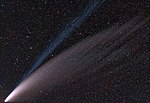C/2019 U6 (Lemmon)
 C/2019 U6 observed with an amateur telescope in June 2020 | |
| Orbital characteristics | |
|---|---|
| Observation arc | 1.54 yr |
| Aphelion | 960 AU (inbound) 604 AU (outbound) |
| Perihelion | 0.91427 AU |
| Last perihelion | 18 June 2020 |
| Next perihelion | ~10,500 yr (inbound)[1] ~5,200 yr (outbound) |
| Earth MOID | 0.0288 AU (4.31 million km; 11.2 LD) |
C/2019 U6 (Lemmon), or Comet Lemmon is a long period comet with a near-parabolic orbit discovered by the Mount Lemmon Survey on October 31, 2019.[2] It made its closest approach to the Sun on June 18, 2020. In June 2020 it was visible near the naked eye limit at an apparent magnitude of 6.0.[3] It is the 3rd brightest naked eye comet of 2020 after C/2020 F3 (NEOWISE) and C/2020 F8 (SWAN). It remained visible near the naked eye limit in June.[4]
This perihelion passage will decrease the comet's orbital period from about 10500 years to about 5200 years.[1]
Even though C/2019 U6 has an Earth-MOID of 0.0288 AU (4.31 million km; 11.2 LD),[2] the closest approach to Earth was on June 29, 2020 at a distance of 0.82 AU (123 million km; 320 LD).
References
- ^ a b JPL Horizons barycentric solution for epoch 1950 (before entering planetary region)
Goto JPL Horizons
Ephemeris Type: Orbital Elements
Center: @0 (Solar System Barycenter)
Time Span: 1950-01-01 to 2050-01-01 and Step Size: 100 years
1950-Jan-01 is "PR= 3.84E+06 / 365.25 days" = 10513 years - ^ a b "JPL Small-Body Database Browser: C/2019 U6 (Lemmon)". ssd.jpl.nasa.gov. Retrieved 11 April 2020.
- ^ Ghosh, Trinankur. "Comet Observation database (COBS)". Retrieved 10 May 2020. "C/2019 U6 plot" Archived 2020-07-18 at the Wayback Machine
- ^ Seiichi Yoshida. "C/2019 U6 ( Lemmon )". Retrieved 10 May 2020.
External links
- C/2019 U6 at the JPL Small-Body Database





